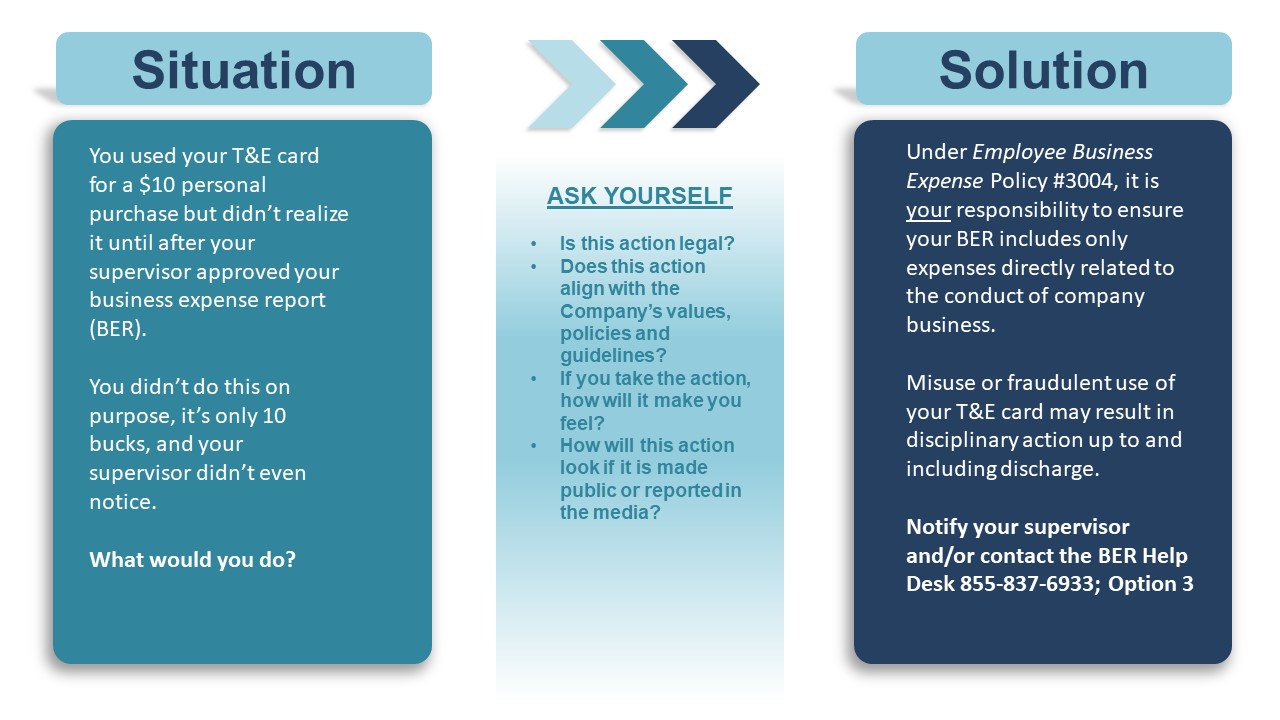Q2 2020 Integrity Advocate
Deadliest Corporate Crime in U.S. History
On June 16, 2020, Pacific Gas and Electric Company (PG&E) pled guilty to 84 counts of involuntary manslaughter and one count of unlawfully starting the deadliest wildfire in California's history. PG&E's admission of guilt makes this the most fatal corporate crime in U.S. history.
The Butte County blaze, known as Camp Fire, began November 8, 2018. It burned for two and a half weeks, and in addition to the loss of life, it scorched more than 153,300 acres, destroying more than 18,800 homes, businesses, and other structures.
An investigation by the California Public Utilities Commission's Safety and Enforcement Division (SED) found that PG&E electrical lines caused the fire. SED's incident investigation report cites 12 violations of state rules. According to the report, a failed piece of equipment at Tower 27/222, a 99-year-old transmission tower, well beyond its useful life, with no inspection records for 17 years, caused the fire.
Each of the 84 manslaughter counts read PG&E, "had a legal duty to the public to avoid wildfires and failed to perform that legal duty by recklessly failing to maintain and operate its electrical lines and equipment in a manner that would minimize the risk of catastrophic wildfires posed by those electrical lines and equipment, resulting in the Camp Fire."
Sadly, Camp Fire is but one of numerous fires in recent years caused by problems with PG&E's electrical network equipment. Early in 2019, facing $30 billion in wildfire liabilities, PG&E filed bankruptcy, the terms of which–include an overhaul of PG&E's board selection process, financial structure, and oversight– were settled with the state in March 2020.

A home burns as the Camp Fire tears through Paradise, California on November 8, 2018. Photographer: Josh Edelson/AFP/Getty Images
PG&E's troubled safety history goes beyond its electrical network and wildfires. In 2010 an explosion of one of its gas pipelines killed eight people in a suburban California neighborhood, prompting regulators to investigate its safety practices. The state's Public Utilities Commission concluded in their report that PG&E was more concerned with profit than with safety.
“There was very much a focus on the bottom line over everything: ‘What are the earnings we can report this quarter?’” said Mike Florio, a utilities commissioner from 2011 through 2016. “And things really got squeezed on the maintenance side.”
What Can We Learn From PG&E?
How We Conduct Our Business is Essential. How we conduct our business is integral to achieving our strategic priorities. That’s why every decision we make should err on the side of integrity, rather than be motivated by a desire to “cut corners,” “fly under the radar,” “squeak by,” or be based on the assumption that we “won’t get caught.” Anything less than the utmost demonstration of business integrity will erode the confidence of our stakeholders, including customers, vendors, suppliers, shareholders, and our valued employees.
Company Culture is Integral. Culture can either strengthen or undermine a company’s strategic objectives. MPC’s strategic priorities use an integrated business model and disciplined approach to capital allocation to deliver profitable growth and enhance shareholder returns while focusing on safe and reliable operations.
Safety and Environmental Stewardship is Paramount. 130+ years of success in the energy industry is no accident. We succeed, in large part, because we hold true to our core value of safety and environmental stewardship. Protecting our people, the communities we operate within, and the world we all share has always been, and remains, a priority. We support this commitment through extensive, ongoing education and training, rigorous standards and compliance audits, as well as investment in equipment, systems, processes and other resources. We embrace continuous improvement as an essential element of achieving our ambition of zero incidents.
Taking Personal Accountability is Vital. By each of us, at all levels within the enterprise, embracing and promoting our core values with the guideposts of trust, respect, honesty and dignity as foundational to our daily decision making, business transactions and interactions with each other, we’ll cultivate an ethical culture, which will:
· Attract and retain talent;
· Engage, motivate and develop employees;
· Foster innovation;
· Encourage solutions;
· Ensure compliance;
· Strengthen business performance; and
· Protect health and safety.
Reporting Safety Concerns
Each of our business segments has specifically designed functions for reporting hazards and improvement suggestions so that employees have an anonymous channel for sharing comments and concerns. Such programs are also important to ensure we have employee feedback and input when it comes to strengthening our management approach and safety standards. Learn more by visiting Corporate Environment, Safety, Security and Product Quality’s TeamView.
The Integrity Helpline is an additional resource for reporting concerns of illegal or unethical conduct, safety related or otherwise:
Toll-free phone number: (855) 857-5700
International Dialing:
Mexico - All Carriers 800.681.6945
Mexico - Telmex 001 866 376 0139
Singapore - All Carriers 800.852.3912
Singapore - Singapore Telecom 001 800 1777 9999
Web reporting: www.FuelingIntegrity.com
Misconduct in America’s Game Draws Parallels
Baseball has been part of the American culture for more than 180 years; it's America's game. It's no surprise then that baseball fans rejoiced on June 22, 2020, when Major League Baseball (MLB) commissioner Rob Manfred announced a 2020 season to begin in July despite the COVID-19 pandemic, albeit only 60 games. The announcement came after months of contentious negotiations between MLB and the MLB Players Association (MLBPA).
MLB is no stranger to controversy. The league has a sordid past of misconduct and scandal, the most notable and salacious likely being the Black Sox scandal. During the 1919 World Series, eight Black Sox players were accused of receiving bribes to throw the series to the Cincinnati Reds. The eight players, including Shoeless Joe Jackson, were banned from baseball for life.

In 1989, Pete Rose, aka "Charlie Hustle," was also banned from baseball for life. Pete's charges of wrongdoing were that he gambled on baseball games, including his team when he played for and managed the Cincinnati Reds.
Aside from gambling, the "steroid era" of the late 1990s and early 2000s had an everlasting effect on the game. Game attendance and TV ratings soared during this period, only to plummet when the home-run chases between players like Sammy Sosa and Mark McGwire ended.
Fast forward to 2019 when a "whistleblower," former Astros pitcher, Mike Fiers, prompted an MLB investigation into the Houston Astros sign-stealing scandal. Stealing hand signals is a time-honored practice, but the Astros did so during the 2017 and 2018 season using a center field camera–a clear violation of MLB policies covering sign stealing. The Astros won the World Series in 2017 and opposing teams and fans have cried foul!
Parallels can be drawn between baseball's if-you-ain't-cheatin'-you-ain't-tryin' culture and business. Left unchecked and allowed to continue, misconduct becomes the norm, eroding trust and placing the legitimacy of an organization in doubt.
How the game is played and how we conduct our business is essential. Winning at all costs can cause long-term, even irreparable damage. It's just not worth it.
Play Your Part
The “Great American Pastime” has a history of and reputation for fraud and corruption; would you want MPC to have the same reputation? Of course not, but you must play your part because illegal and unethical conduct usually affects us all, not the bad actor alone.
Under our Code of Business Conduct[1] and Policy #2008 – Reporting Illegal or Unethical Conduct[2], employees must immediately report any suspected illegal or unethical conduct connected with MPC's business. Under this policy, no employee will be discharged, disciplined, or otherwise disadvantaged in his or her employment or suffer any other form of retaliation because of having reported, in good faith, suspected illegal or unethical conduct by others. Play your part by speaking up.
Step Up to the Plate and Report
Report suspected or known illegal or unethical conduct to your supervisor, your supervisor's manager, Internal Audit, Law, Human Resources, Environment, Safety, Security & Product Quality, or anonymously to the Integrity Helpline.
Toll-free phone number: (855) 857-5700
International Dialing:
Mexico - All Carriers 800.681.6945
Mexico - Telmex 001 866 376 0139
Singapore - All Carriers 800.852.3912
Singapore - Singapore Telecom 001 800 1777 9999
Web reporting: www.FuelingIntegrity.com
[1] Speedway Code of Business Conduct
[2] Speedway Policy #2007 – Reporting Illegal or Unethical Conduct
It Happened Here
The following scenarios happened with employees at our company. Situations and descriptions have been edited to maintain anonymity and confidentiality.
Click arrows below to view the company response to the concern.
The Concern: Lead Assistant Manager (LAM) went to employee’s home to see if he would come to work on his day off after failing to respond to phone calls and text messages.
The Response: Investigation confirmed manager advised LAM to go to the employee’s home to see if he would come to work. Both employees received counseling on the company’s anti-harassment policy.
The Concern: Two employees were involved in a skirmish while on duty.
The Response: Investigation confirmed employee pushed a co-worker in an aggressive manner. Employee received a final warning and a 1-day suspension; co-worker counseled for role in instigating.
The Concern: Employee repeatedly talked down to other employees and would not follow any safety rules.
The Response: Investigation found employee participated in unsafe behaviors and harassment of others. Employee no longer works for the company.
Be an Integrity Advocate
Being an advocate is about speaking up not only about what may be wrong, but also about what is going right. Examples of ethical conduct should be highlighted and celebrated!
We invite you to help expand the scope of “It Happened Here” to include positive stories of integrity in action in future issues of the Integrity Advocate by submitting instances of integrity in action to Business Integrity and Compliance, Room M01004 Findlay Campus or [email protected].

